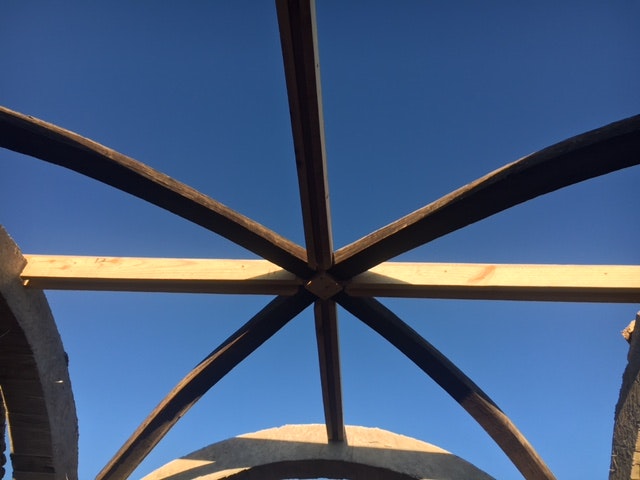We spent the weekend happily working on our little chapel. The masonry is done with mud…sun-dried mud bricks set in place with mud mortar. The dirt is dug from a nearby hillside…and then mixed with water and sometimes straw.
Mud is a pleasure to work with. If it doesn’t turn out the way you want, you just knock it down, add water, and remix.
More difficult is the carpentry. We framed up a roof of intersecting barrel vaults with, what else, the oak staves of an old wine barrel. Ours is by no means ‘fine carpentry’. But once covered with cane and mud, we expect it to hold up. We’ll see how it turns out. Stay tuned.
|
|
| Source: Bill Bonner |
In the meantime, we are trying to gain perspective…
First, we note that prices are rising — just as they should. Central banks around the world have added about US$25 trillion in extra cash since 2007; what do you expect? Brietbart:
‘Consumer goods and services cost Americans 6.4 percent more than a year prior in February, the latest data from the U.S. government showed on Thursday.
‘The personal consumption expenditure price index rose by more than expected and indicated that inflation accelerated from the six percent annual rate in January. This was the fastest rate of price increases since 1982.’
In the short run, there could be some relief from rising prices, but over the longer run, more price hiking seems inevitable. Higher costs of basic commodities now almost guarantee higher prices for finished products later.
Boondoggles and rip-offs
We visited some large, commodity-producing farms on the eastern side of Salta province last week — about a six-hour drive from where we live. More like Kansas than Nevada, it is very different from what we are used to. And though the farmland there is ‘marginal’ compared to the fertile, well-watered lands around Buenos Aires, it is still very productive.
Agriculture is the most profitable industry in the country. And since it is where the money is, it’s also where the politicians look to finance their boondoggles and rip-offs.
One of the boondoggles was on display on our trip to the farm. Driving through a small, dusty farm town, we were suddenly brought to a halt. Traffic — mostly heavy trucks transporting grains or fuel — was lined up ahead of us.
‘What’s going on?’ we asked our companion.
‘It’s a demonstration. They’ve stopped traffic. They do it all the time down in Buenos Aires, but it’s the first time I’ve seen it here.’
The police were already on the scene.
‘They’ll probably let us wait for a while, giving the demonstrators an opportunity to make their point.’
We got out to look more carefully. The protesters wore red vests…and waved red flags. The gist of their complaint was that inflation — now about 50% per year — has reduced the real purchasing power of their money. But it’s a special kind of money — it’s money they get from ‘planes’…a kind of gimme/stimmy program set up by a socialist government 20 years ago. The ‘planes’ are part welfare and part universal basic income.
Payments are pitifully low. But in this part of the country — where many people still live in mud huts — they are enough to live on. As a result, a lot of people don’t work.
An ill wind blows
‘It’s sad what has happened’, said an old friend when we got back home to the Calchaqui valley.
‘When I was little, there were no single mothers here. None. It took two people — a family — to survive. Of course, they didn’t always get along, but they had to work out their differences. And they were better off for it, in my opinion.
‘Now, women get money from the government based on how many children they have. They depend on the government, not on their husbands. And the government depends on their votes to stay in power. The government even encourages them to get rid of their men. “Men get drunk…men are violent.” Etc. Etc. There are billboards encouraging them to call the police on their husbands. And most children now grow up with no father in the house. Instead, the women have “visitors”…and then have more children. They say the father is “the wind”.’
In the country at large, only about 40% of the people work and pay taxes. The others are supported by the ‘planes’ and/or off-the-books, informal, black-market gigs. (The US is catching up fast — with only 43% of eligible taxpayers paying federal income tax last year.)
‘Once you go down that road’, said our companion, ‘it’s a long way down. Politics takes over. People get their money from politics, not from working. And they think they can get more money by using more politics. You know, demonstrations. Making it hard to do business. Blocking traffic. Harassing anyone who doesn’t go along. And they’re right. That’s the way it works. The government responds to political pressure, not what’s right or wrong. And not what makes people better off.’
How far down is ‘down?’
In the last few days, we’ve been offered the opportunity to buy good farmland in North Carolina at US$7,500 an acre. Down here it is US$1,200 an acre. We don’t pretend that this is an accurate or meaningful comparison. For that, you’d have to make a much more detailed analysis. But our guess is that it shows what a determined government can do to the value of its most productive asset.
Regards,
 |
Bill Bonner,
For The Daily Reckoning Australia


